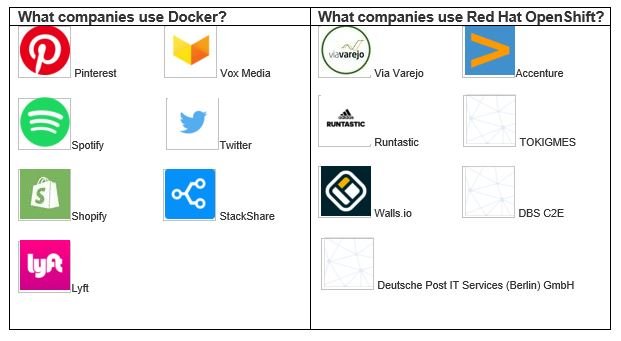Dear friends, today we will see what are the differences between Docker and OpenShift? So, let’s start and see step by step what are the differences between Docker and OpenShift.
What is Docker?
Open source containerization motor Docker gives pressing, shipping, and sending of the program, displayed as a lightweight holder that can be run anyplace. Docker container comprises program components counting libraries, records, scripts, etc.

For more about Docker you can Click-Here
What is OpenShift?
Composed in go, a computer program item of Ruddy Cap that has container-based sending. Utilizing Docker containers, OpenShift gives the conveyance of Kubernetes. It gives to get to DevOps related apparatuses. OpenShift is accessible in four models. It is very curious to know that area on which these models run may contrast but their usefulness is the same.

For more details about Red Hat OpenShift you can Click-Here
What are the differences between Docker and OpenShift?
Developers portray Docker as “Venture Container Platform for High-Velocity Innovation”. The Docker platform is the industry-leading holder stage for persistent, high-velocity advancement, empowering organizations to consistently construct and share any application from the bequest to what comes following and safely run them anyplace. On the other hand, OpenShift is nitty-gritty as “Red Hat’s free Platform as a Benefit (PaaS) for facilitating Java, PHP, Ruby, Python, Node.js, and Perl apps”. OpenShift is Red Hat’s Cloud Computing Platform as Benefit (PaaS) advertising. OpenShift is an application stage within the cloud where application engineers and groups can construct, test, send, and run their applications.
Docker has a place to the “Virtual Machine Stages & containers” category of the tech stacks, whereas OpenShift can be essentially classified beneath “Platform as a Service”.
Some of the highlights advertised by Docker are: –
- Integrated engineer tools
- open, convenient images
- shareable, reusable apps
OpenShift gives the taking after key features: –
- While OpenShift gives the taking after key features: Built-in back for Node.js, Ruby, Python, PHP, Perl, and Java (the standard in today’s Enterprise)
- OpenShift is extensible with customizable cartridge usefulness that permits engineers to include any other dialect they wish. We have seen the whole thing since Clojure to COBOL running on OpenShift.
- OpenShift underpins systems extending from Spring to Rails, to Play
- “Rapid integration and construct up” is the best reason why over 816 designers like Docker, whereas over 95 designers say “Good Free plan” as the driving cause for choosing OpenShift.
Docker and OpenShift are both open source apparatuses.
Docker with 54K GitHub stars and 15.6K forks on GitHub shows up to is better known than OpenShift with 915 GitHub stars and 563 GitHub forks.
Spotify, Pinterest, and Twitter are some of the widespread companies that use Docker, while OpenShift is utilized by Accenture, Vungle, and Hazeorid. Docker contains a broader endorsement, being said in 3527 company stacks & 3449 designer stacks; compared to OpenShift, which is recorded in 50 company stacks and 52 designer stacks.
Distinguish between Docker and OpenShift
Pros of Docker
- Rapid addition and build up
- Isolation
- Open source
- Testability and reproducibility
- Lightweight
- Standardization
- Scalable
- Upgrading / downgrading / application versions
- Security
- Confidential PaaS environments
- Portability
- Limit source usage
- I like the way docker has altered virtualization
- Game changer
- Fast
- Concurrency
- Docker’s Compose tools
- Easy business
- Fast and Portable
- It’s dope
- Creates shipping to manufacture very simple
- Docker node for the FTW
- Very easy to unit join together and build
- Package the surroundings with the application
- Open source and highly configurable
- Unfussiness, seclusion, resource effectual
- Highly helpful
- MacOS support FAKE
- Its cool
Pros of Red Hat OpenShift
- Fine free plan
- Open Source
- Easy business
- Nodejs support
- Well documented
- Custom fields
- Mongodb support
- Clean and simple architecture
- PHP support
- Customizable environments
- Ability to run CRON jobs
- Easier than Heroku for a WordPress blog
- Easy deployment
- Fine stability between Heroku and AWS for flexibility
- PostgreSQL support
- Auto scaling
- Shell access to gears
- At no cost, simple Setup, Lot of Gear or D.I.Y Gear
- Great hold up
- Its has no charge and offer tradition domain practice
- Overly complicated and over engineered in majority of e
- Golang support
- Simple setup and great purchaser support
- This is the only free of charge one among the three as nowadays
- No credit card needed
- Meteor support
- It is easy to manage
- Great free plan with excellent support
- Autoscaling at a good price point
Cons
Cons of Docker: –
- New editions == broken characteristics
- Moves fast
- Certification not always in sync
- Untrustworthy networking
Cons of Red Hat OpenShift: –
- Choices are made for you, restraining your options
- After, from time to time severely, the upstream
- License price
Jobs that mention Docker and OpenShift as a desired skillset
Docker
- Senior Test Automation Engineer – Restaurant (f/m/d)
- Senior Backend Engineer (Golang) – Global Contact Centre Tech (f/m/d)
- Associate Software Engineer (f/m/d) (Senior) Python Data Engineer – Data & Machine Learning (f/m/d)
Red hat OpenShift
- Senior Java Backend Engineer – Logistics (f/m/d)
- Senior Backend Software Engineer (Python) – Global Contact Centre Tech (f/m/d)
- Software Engineer Intern – Global Contact Center(f/m/d) (Senior) Python Data Engineer – Marketing Tech (f/m/d)
Haired by companies: –

Hello! I just want to give a huge thumbs up for the nice info you’ve here on this post. I will likely be coming back to your blog for extra soon.